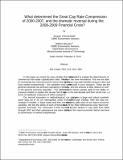| dc.contributor.author | Chervachidze, Serguei | |
| dc.contributor.author | Wheaton, William C. | |
| dc.date.accessioned | 2013-12-09T13:31:34Z | |
| dc.date.available | 2013-12-09T13:31:34Z | |
| dc.date.issued | 2011-08 | |
| dc.identifier.issn | 0895-5638 | |
| dc.identifier.issn | 1573-045X | |
| dc.identifier.uri | http://hdl.handle.net/1721.1/82878 | |
| dc.description.abstract | In this paper we revisit the many studies that have attempted to explain the determinants of commercial real estate capitalization rates. We introduce two new innovations. First we are able to incorporate two macroeconomic factors that greatly impact cap rates besides treasury rates and local market fundamentals – the variables most commonly used in such research. These are the general corporate risk premium operating in the economy, and the growth rate of debt relative to GDP in the general economy (liquidity). The addition of these factors greatly adds to the ability of previous models to explain the secular fall of cap rates in the last decade and their recent rise – in terms of traditional measures of within-sample fit. Our second innovation is methodological; our analysis uses a large and robust quarterly panel data set of over 30 US metropolitan areas from 1980q1 through 2009q3. With this data we compare 3 models: a “base model” and then one that selectively adds each of our macro-economic variables. We test the ability of each of these models to fit the 2002–2009 period using “back test” dynamic forecasts. Our conclusion is that much of the secular decline in cap rates from 2000 through 2007 and their subsequent rise seem attributable to the macro-economic factors and less to movements in market fundamentals. | en_US |
| dc.language.iso | en_US | |
| dc.publisher | Springer-Verlag | en_US |
| dc.relation.isversionof | http://dx.doi.org/10.1007/s11146-011-9334-z | en_US |
| dc.rights | Creative Commons Attribution-Noncommercial-Share Alike 3.0 | en_US |
| dc.rights.uri | http://creativecommons.org/licenses/by-nc-sa/3.0/ | en_US |
| dc.source | Other univ. web domain | en_US |
| dc.title | What Determined the Great Cap Rate Compression of 2000–2007, and the Dramatic Reversal During the 2008–2009 Financial Crisis? | en_US |
| dc.type | Article | en_US |
| dc.identifier.citation | Chervachidze, Serguei, and William Wheaton. “What Determined the Great Cap Rate Compression of 2000–2007, and the Dramatic Reversal During the 2008–2009 Financial Crisis?” The Journal of Real Estate Finance and Economics 46, no. 2 (February 2, 2013): 208-231. | en_US |
| dc.contributor.department | Massachusetts Institute of Technology. Center for Real Estate | en_US |
| dc.contributor.department | Massachusetts Institute of Technology. Department of Economics | en_US |
| dc.contributor.mitauthor | Wheaton, William C. | en_US |
| dc.relation.journal | The Journal of Real Estate Finance and Economics | en_US |
| dc.eprint.version | Author's final manuscript | en_US |
| dc.type.uri | http://purl.org/eprint/type/JournalArticle | en_US |
| eprint.status | http://purl.org/eprint/status/PeerReviewed | en_US |
| dspace.orderedauthors | Chervachidze, Serguei; Wheaton, William | en_US |
| dc.identifier.orcid | https://orcid.org/0000-0003-2962-8259 | |
| mit.license | OPEN_ACCESS_POLICY | en_US |
| mit.metadata.status | Complete | |
